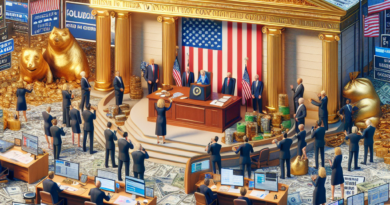Why Market Volatility Shouldn’t Be a Cause for Alarm
US Stock Markets Face Increased Risks as Election Approaches
In recent months, US stock markets have been grappling with a myriad of escalating risks.
This has prompted numerous investors to seek protective instruments for their portfolios, as evidenced by the fluctuations in the options markets.
Key concerns revolve around economic uncertainties, shifts in the Federal Reserve’s policies, and the impending presidential elections.
As attention turns to the televised debate this Tuesday between Democratic candidate Kamala Harris and Republican Donald Trump, the Cboe Volatility Index (VIX) hovers around 20, a significant spike compared to the average of 14.8 for 2024.
The VIX serves as a crucial barometer for gauging demand for protection against stock market fluctuations.
The Impact of Elections on Volatility
Typically, election years see the VIX increase by approximately 25% from July to November, as investors assess the potential impacts of candidates’ political proposals on the markets.
However, this year, political uncertainties intertwine with more immediate volatility triggers, including economic uncertainty and anticipated interest rate cuts by the Fed.
Market Reactions and Performance
Recently, the S&P 500 index registered its worst weekly performance since March 2023, further heightening investor anxiety.
Despite a robust 15% growth since the start of the year, the market remains acutely aware of elevated risks, though the exact nature of these threats is still unclear.
With volatility levels already high, the anticipated increase in VIX tied to the October elections appears significantly lower than in previous years.
On Tuesday, October VIX futures traded at 19.55, only slightly above September’s contracts.
Furthermore, the gap between the highest and lowest volatility contracts is merely one point.
Historical Context and Analyst Insights
In the 2016 and 2020 elections, this gap was notably wider, measuring at 7.3 and 3.4 points, respectively.
This trend indicates that while current volatility remains high, the elections this year are inciting less nervousness compared to prior cycles.
Analysts from Société Générale have advised investors to maintain hedges on their portfolios in the upcoming three to six months, considering possible economic surprises and geopolitical factors like the US elections and conflicts in the Middle East and Ukraine.
However, some analysts argue that the electoral risk this year is less daunting.
Both under Trump’s and Biden’s administrations, markets have performed admirably.
Therefore, the potential victory of either candidate is not seen as a major threat, particularly in light of the continuity of Harris’s policies resembling those of Biden.
For further insights, read more about financial strategies such as the comparison between purchasing BTPs or renting out properties.
(Read more)




